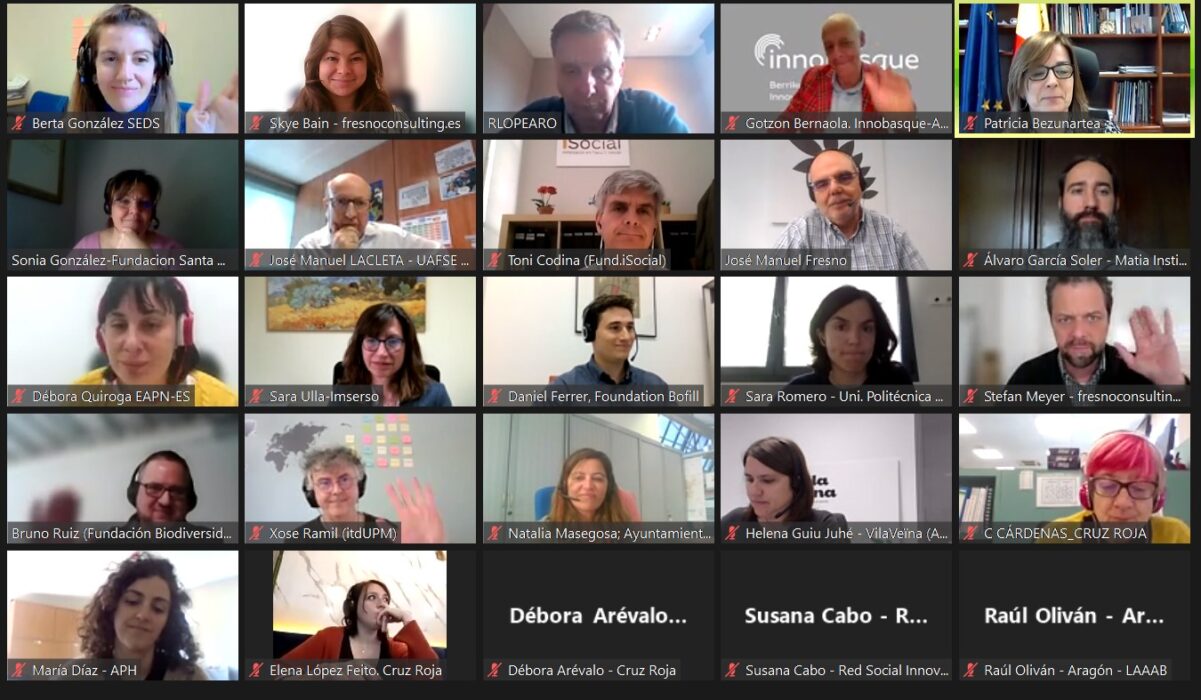Reunión de las partes interesadas españolas para validar la cartografía de los ecosistemas de innovación social
El 4 de mayo, una muestra representativa de actores españoles se reunió por invitación de la Secretaría de Estado de Derechos Sociales (SEDS) para discutir el borrador del informe sobre el ecosistema español de innovación social elaborado en el marco de la segunda línea de trabajo del proyecto BuiCaSuS.
Patricia Berzunatea, Directora General de Diversidad Familiar y Servicios Sociales, abrió el encuentro virtual señalando la importancia de la innovación social para afrontar los complejos retos de nuestro tiempo. Si bien es cierto que en España existe un vivo panorama de iniciativas, todavía no existe una esfera pública a nivel estatal en la que se compartan y analicen prácticas y conceptos y se evalúen las condiciones que hacen florecer los ecosistemas locales y regionales de innovación social. La administración pública tiene un papel especial tanto en la generación de innovación social desde sus propias estructuras como en asegurar la asimilación de la innovación en las políticas públicas. Siguiendo las experiencias de los estados miembros de la UE y el intercambio facilitado por la Comisión Europea en una Plataforma de Aprendizaje, el Ministerio está trabajando en el diseño institucional de una estructura de apoyo a nivel nacional que aglutine la riqueza de estas iniciativas en el territorio español: un Centro de Referencia para la Innovación Social (CERIS).
Ángel García Frontelo, subdirector general de la Autoridad de Gestión del FSE en el Ministerio de Trabajo, resumió las condiciones en el nuevo ciclo de programación del Fondo Social Europeo para 2021-27, como se expresa en la normativa. En concreto, las disposiciones dan cabida a dos instrumentos: la innovación social y la experimentación social. En particular, se prioriza la innovación social al rebajar la tasa de cofinanciación a un mero 5%. Esto hace que se dediquen al tema unos 527 millones de euros para España. En la actualidad, los programas operativos se elaboran tanto a nivel estatal como a nivel regional, y se aprobarán, como muy tarde, antes de que finalice el año. Si bien se están estableciendo ciertas partidas en el programa a nivel estatal, también algunas regiones parecen inclinarse por establecer una prioridad en la innovación social en sus programas operativos.
Berta González Antón, asesora técnica de SEDS, y Stefan Meyer, asistencia técnica para BuiCaSuS de Fresno the right link, presentaron las conclusiones del estudio, dividido metodológicamente en una investigación bibliográfica general del panorama español y un abordaje de estudio de casos para comprender los cuellos de botella y los motores que hacen que los ecosistemas de innovación social se esfuercen. Las conclusiones se resumen en doce tesis. A continuación, el grupo entabló un debate dinámico, primero en grupos de trabajo y luego informando al pleno. El informe se publicará en junio, tras recoger algunos de los comentarios y críticas que surgieron en el foro y que se entregaron por escrito.
José-Manuel Fresno, Director de Fresno the right link, clausuró la conferencia, resumiendo los temas debatidos en tres observaciones y tres conclusiones para el futuro.
Observaciones
- Existe una clara conciencia de que tenemos problemas complejos en nuestro entorno que deben ser tratados de diferentes maneras. Muchas iniciativas, algunas de ellas muy localizadas, demuestran que hay formas de hacer las cosas mejor y de encontrar respuestas más adecuadas y eficaces.
- No basta con que haya muchas pequeñas iniciativas donde se haga innovación social. Como el conjunto de pequeñas iniciativas no necesariamente crea un ecosistema o transforma una política, es necesario que haya un entorno más adecuado donde la suma logre ejercer un impacto y transformar las políticas.
- Ahora es un momento oportuno para ello, porque los actores en España están empezando a unirse. La práctica está ahí, tanto a nivel internacional como en las regiones españolas, y hay fondos para impulsar realmente la innovación social con impacto.
Conclusiones para el futuro
- Cambio cultural: Para fortalecer a los actores españoles en conocimiento y competencia para la innovación social, es necesario tomar medidas que fomenten el cambio cultural, tanto en las administraciones públicas como en las organizaciones del tercer sector, así como generar sinergias entre ellas para una comunidad de práctica de la innovación social.
- Implicación de diferentes actores: es necesario un enfoque multiactor, que incluya a las administraciones públicas, empresas, organizaciones no gubernamentales, comunidades, etc., así como con nuevos perfiles profesionales y nuevos métodos de trabajo.
- Iniciativa pública y actores públicos: Es necesario un mayor impulso público para crear las condiciones necesarias. Esto implica proporcionar las condiciones normativas y de financiación y los espacios y estructuras para la conexión y cooperación entre proyectos, así como enfoques sistemáticos para que las iniciativas se amplíen y “escalen” a las políticas públicas.
Spanish stakeholders meet to validate the mapping of social innovation ecosystems
On 4th of May, a cross-section of Spanish stakeholders met on invitation of the State Secretary of Social rights (SEDS) to discuss the draft report on the Spanish ecosystem of social innovation elaborated in the framework of the workstream two of the BuiCaSuS project.
Patricia Berzunatea, Director General for Family Diversity and Social Services, opened the virtual encounter by stating the importance of social innovation to face the complex challenges of our times. While there is a vivid landscape of initiatives in Spain, there is not yet a public sphere at state level in which practices and concepts are shared and scrutinized and conditions are assessed that make local and regional ecosystems of social innovation flourish. The public administration has a particular role both in generating social innovation from their own structures as well as ensuring the take-up of innovation into public policies. Following experiences in the EU Member States and the exchange facilitated by the European Commission in a Learning Platform on Social Innovation, the Ministry is working on an institutional design of a support structure at national level that would bring the richness these initiatives in the Spanish territory together: a Competence Centre for Social innovation (CERIS).
Ángel García Frontelo, Subdirector general of the FSE Managing Authority in the Ministry of Labour, resumed the conditions in the new programming cycle for the European Social Fund for 2021-27, as expressed in the regulations. Specifically, the provisions make space for two instruments: social innovation and social experimentation. Notably, social innovation is prioritized by lowering the co-financing rate to a mere 5 per cent. This makes about 527 million euros for Spain dedicated to the topic. Currently, the operational programmes are drawn up both at state level and at regional level, to be approved before the end of the year at the latest. Whilst certain earmarks are being set at the state level programming, also some regions seem inclined to set social innovation as a priority in their operational programmes.
Berta González Antón, technical advisor in SEDS, and Stefan Meyer, technical assistance to BuiCaSuS from Fresno the right link, presented the findings of the study, divided methodologically into general literature research of the Spanish landscape and a case study approach towards understanding the bottlenecks and drivers that make ecosystems of social innovation strive. Twelve theses summarize the findings. The group then engaged in a lively debate, first in working groups and then reporting to plenary. The report is to be published in June, after taking up some of the comments and critique, that emerged from the forum and was given in writing.
José-Manuel Fresno, Director of Fresno the right link, closed the conference, summarizing the debated issues in three observations and three take-aways for the future.
Observations
- There is a clear realisation that we have complex problems in our environment that need to be dealt with in different ways. Many initiatives, some of them very localized, demonstrate that there are ways to do things better and find more appropriate and efficient answers.
- It is not enough that there are many small initiatives where social innovation is done. As the collection of small initiatives does not necessarily create an ecosystem or transform a policy, there needs to be a more suitable environment where the summing-up achieves impacts and policy transformations.
- Now is an opportune moment because the actors in Spain are starting to come together, the practice is there both internationally and in the Spanish regions, and there are funds to really push for social innovation with impact.
Take aways for the future
- Cultural change: To strengthen Spanish actors in knowledge and competence for social innovation, measures need to be taken that foster cultural change, both in public administrations and in third sector organisations, as well as generating synergies amongst them for a community of practice of social innovation.
- Involvement of different actors: a multi-actor approach is needed, including public, enterprise, nongovernmental, communities etc, as well as with new professional profiles and new working methods.
- Public initiative and public actors: We need more public impetus to create the conditions. This implies providing the regulatory and funding conditions and spaces and structures for connection and cooperation between projects, as well as systematic approaches for initiatives to scale up and “scale-into” public policies.







